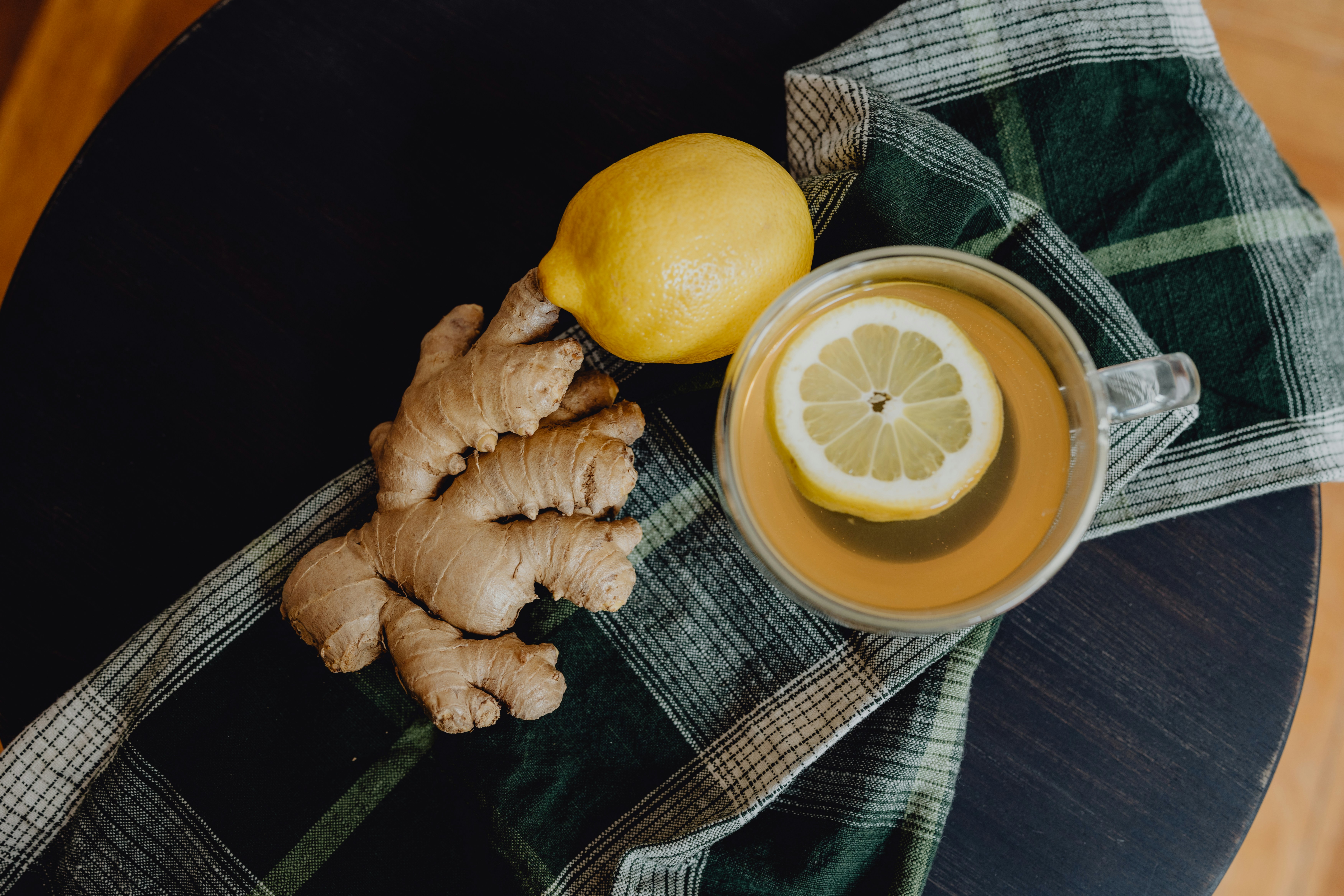
Introduction to Ginger and Lemon
Ginger and lemon, two distinct yet harmoniously complementary ingredients, have garnered considerable attention in the realms of health and wellness. Ginger, scientifically known as Zingiber officinale, is a flowering plant originating from Southeast Asia. Renowned for its spicy rhizome, ginger has been utilized for centuries for its medicinal properties, including anti-inflammatory and antioxidant effects. Conversely, lemon, belonging to the Citrus limon species, is believed to have originated in the Himalayan region and has served not only as a culinary delight but also as a natural remedy in traditional medicine due to its high vitamin C content and numerous health benefits.
Both ginger and lemon are staples in various culinary traditions around the world, often found in recipes ranging from savory dishes to sweet desserts, as well as in beverages like teas and smoothies. The flavor profiles they offer are distinct; ginger adds a warming spiciness, while lemon contributes a refreshing tartness. This unique combination is not only valued for its taste but also for its potential health advantages, making it increasingly popular among health enthusiasts.
Many individuals are turning to ginger and lemon for their synergistic benefits. Studies have suggested that this powerful duo can aid digestion, boost the immune system, and provide relief from common ailments such as colds and nausea. The combination is frequently touted for its role in detoxification and promoting overall well-being. As the interest in natural health remedies continues to grow, ginger and lemon are emerging as essential components in promoting a healthier lifestyle.
Nutritional Profile of Ginger
Ginger (Zingiber officinale) is not only a popular culinary ingredient but also a valuable source of numerous nutrients beneficial to health. It’s primarily known for its pungent flavor, attributed to its active compounds, notably gingerol, which is recognized for its antioxidant and anti-inflammatory properties. Ginger is low in calories but rich in essential nutrients, making it an ideal addition to various diets.
One of the standout features of ginger is its impressive array of vitamins and minerals. It contains small amounts of vitamins B6 and C, both of which play pivotal roles in metabolic processes and immune function. Vitamin B6 contributes to hormone regulation and red blood cell formation, while vitamin C is an essential antioxidant that helps protect the body from oxidative stress and enhances the immune system.
Ginger also provides important minerals such as magnesium, potassium, and manganese. Magnesium aids in muscle function and supports energy production, while potassium helps regulate blood pressure and fluid balance. Manganese is crucial for bone health and the metabolism of macronutrients. The combination of these nutrients supports various bodily functions and promotes overall well-being.
In terms of bioactive compounds, ginger is particularly notable for its gingerol content, which exhibits anti-inflammatory and pain-relieving effects. Research has shown that gingerol may play a role in reducing the risks associated with chronic diseases, such as heart disease and diabetes, by improving blood circulation and reducing inflammation. This active component is also linked to the alleviation of nausea and digestive disorders, further emphasizing the health benefits of incorporating ginger into one’s diet.
The synergistic effects of these nutrients underline ginger’s status as a health-promoting food. By understanding ginger’s nutritional profile, individuals may better appreciate its contribution to a balanced diet and its potential in fostering long-term health benefits.
Nutritional Profile of Lemon
Lemons, renowned for their vibrant flavor and culinary versatility, also possess a remarkable nutritional profile that contributes significantly to health and wellness. Chief among their contributions is vitamin C, an essential antioxidant that plays a crucial role in various bodily functions. One medium-sized lemon contains approximately 30-40 milligrams of vitamin C, which constitutes about 30-40% of the Daily Value recommended for adults. This vital nutrient is known for its role in boosting the immune system, promoting skin health, and aiding in the absorption of iron from plant-based foods.
Beyond vitamin C, lemons are a source of several other important nutrients. They provide small amounts of several B vitamins, including B6, thiamine, and riboflavin, which aid in energy metabolism and brain function. Additionally, lemons contain minerals such as potassium and magnesium, both of which are essential for maintaining cardiovascular health and regulating blood pressure. Potassium in particular is pivotal in managing heart functions, while magnesium supports muscle and nerve function.
Furthermore, lemons contain flavonoids, compounds noted for their antioxidant properties. These antioxidants help combat oxidative stress in the body and may reduce the risk of chronic diseases, including heart disease and certain cancers. The high citric acid content in lemons may also aid in digestion and foster a favorable environment for gut health, promoting an overall healthy digestive system.
In essence, the nutritional profile of lemons makes them not only a delightful addition to culinary creations but also a valuable contributor to health. By integrating lemons into the diet, individuals can harness the benefits of their rich vitamin C content, beneficial antioxidants, and overall nutritional value, ensuring better health outcomes.
Health Benefits of Ginger
Ginger has been widely recognized for its myriad health benefits, making it a popular natural remedy across various cultures. One of the most celebrated benefits of ginger is its ability to alleviate nausea. Multiple studies indicate that ginger can be particularly effective in managing nausea caused by motion sickness, morning sickness during pregnancy, and chemotherapy-induced nausea. Research published in the journal *Supportive Care in Cancer* highlights ginger’s potential in significantly reducing nausea levels among cancer patients undergoing treatment.
In addition to its anti-nausea properties, ginger is renowned for its anti-inflammatory effects. Chronic inflammation is linked to various ailments, including arthritis, cardiovascular disease, and even certain types of cancer. A study featured in the *Journal of Medicinal Food* has shown that compounds found in ginger, such as gingerol, possess potent anti-inflammatory properties. By reducing inflammation, ginger not only alleviates pain associated with conditions like osteoarthritis but also promotes overall joint health.
Moreover, ginger has been praised for its supportive role in digestive health. Its ability to stimulate saliva, bile, and gastric enzymes facilitates digestion, while its natural antispasmodic properties help to ease gastrointestinal discomfort. The *World Journal of Gastroenterology* published findings illustrating ginger’s effectiveness in reducing symptoms of indigestion, bloating, and stomach cramps. These attributes underscore the remarkable capacity of ginger to enhance overall digestive function.
Lastly, the immune-boosting properties of ginger also warrant attention. It is rich in antioxidants, which help protect the body from oxidative stress and combat illness. A study in the *American Journal of Epidemiology* found that regular consumption of ginger is associated with a lower incidence of respiratory infections and enhanced immune response. In this way, incorporating ginger into one’s diet can serve as a natural means of strengthening the body’s defenses against common illnesses.
Health Benefits of Lemon
Lemons, known for their vibrant flavor and tartness, are much more than just a culinary delight; they pack a considerable array of health benefits that can significantly enhance overall well-being. One of the most notable advantages of incorporating lemons into your diet is their ability to boost the immune system. Rich in vitamin C, lemons help to stimulate the production of white blood cells, which are essential for fighting off infections and illnesses. This antioxidant property contributes to a strengthened immune response, particularly during cold and flu seasons.
In addition to immune support, lemons have been recognized for their role in aiding weight loss. The presence of citric acid in lemons has been shown to stimulate metabolism, helping the body to burn fat more efficiently. Furthermore, including lemon juice in warm water can promote feelings of fullness, potentially leading to reduced caloric intake throughout the day. This simple yet effective strategy can aid individuals looking to shed extra pounds and maintain a healthy weight.
Lemons also offer significant benefits for skin health. Due to their antibacterial properties, they can help combat acne and reduce the appearance of scars. The high vitamin C content assists in collagen production, which is vital for maintaining skin elasticity and preventing signs of aging. Many people utilize lemon juice in skincare routines for its natural exfoliating capabilities, providing a fresh and radiant complexion.
Moreover, lemons act as natural detoxifying agents. They facilitate the liver’s ability to cleanse the body by aiding digestion and flushing out harmful toxins. Drinking lemon water regularly can promote hydration, further helping to support metabolic functions. Overall, the incorporation of lemons into daily health regimens can provide significant benefits, as supported by both research and anecdotal evidence.
The Synergistic Effects of Ginger and Lemon
The combination of ginger and lemon is a powerful pairing that offers remarkable health benefits, primarily due to their synergistic effects. Both ginger and lemon are known for their individual health-promoting properties, but when consumed together, they can enhance these effects significantly. This synergy not only amplifies the health benefits but also provides a holistic approach to improving overall well-being.
One of the most notable advantages of this combination is its positive impact on digestion. Ginger has long been celebrated for its ability to alleviate digestive discomfort, including nausea and bloating. Its carminative properties allow it to soothe the digestive tract and enhance the overall digestive process. When paired with lemon, rich in vitamin C and citric acid, the duo works to stimulate the production of digestive juices, further promoting healthier digestion and nutrient absorption.
Another critical benefit of ginger and lemon together lies in their detoxification properties. Both ingredients are natural detoxifiers, aiding the liver in flushing out toxins from the body. Lemon’s high antioxidant content and ginger’s warming properties combine to support the body’s natural detox processes, eliminating harmful substances and fostering improved liver function. This detoxification process is essential not only for physical health but also for maintaining optimal energy levels and preventing illness.
Additionally, ginger and lemon exhibit significant anti-inflammatory properties. Chronic inflammation within the body can lead to various health issues, including arthritis and cardiovascular diseases. The anti-inflammatory compounds found in both ginger—including gingerol—and the vitamin C in lemon work in tandem to reduce inflammation, promoting joint health and improving recovery from physical ailments.
In conclusion, the synergistic effects of ginger and lemon create a powerful duo that enhances digestion, aids detoxification, and showcases anti-inflammatory benefits, making them an essential addition to a healthy lifestyle.
Ways to Incorporate Ginger and Lemon into Your Diet
Integrating ginger and lemon into your daily meals can be both delightful and beneficial for your health. This powerful duo can enhance the flavor of various dishes while providing numerous nutritional advantages. Below are several practical suggestions to seamlessly incorporate ginger and lemon into your regular dietary routine.
One of the simplest ways to enjoy ginger and lemon is by making a refreshing tea. Begin by boiling water and adding fresh slices of ginger. Allow it to steep for about 10 minutes, then add lemon juice and honey to taste. This invigorating drink serves as an excellent morning boost and can also aid digestion throughout the day.
Another effective method is to use ginger and lemon in salad dressings. Combine fresh lemon juice, grated ginger, olive oil, and your choice of spices for a zesty dressing that can enhance even the most basic salads. This adds a flavorful kick while providing a range of health benefits associated with both ingredients.
If you enjoy smoothies, consider adding ginger and lemon to your favorite blend. A simple combination of spinach, banana, ginger, and lemon juice can create a nutrient-dense smoothie that energizes you for the day ahead. You may also explore using these ingredients in various fruit salads, lending a fresh twist to classic options.
Ginger and lemon can also be utilized in marinades for proteins. For instance, a marinade consisting of lemon juice, minced ginger, garlic, and honey can make chicken or fish dishes more flavorful and healthy. This adds depth to your meals, making them more enjoyable while leveraging the health benefits of ginger and lemon.
Embracing the natural flavors of ginger and lemon can dramatically improve your culinary experience, all while promoting better health. Through simple, delicious recipes and creative applications, these ingredients can be an integral part of a balanced diet.
Potential Side Effects and Precautions
While ginger and lemon are widely celebrated for their numerous health benefits, it is essential to acknowledge the potential side effects and interactions these natural ingredients may pose. For most individuals, moderate consumption of ginger and lemon is generally considered safe; however, some people may experience gastrointestinal discomfort, such as heartburn, diarrhea, or nausea, particularly when ginger is ingested in large amounts. It is advisable to start with smaller quantities to assess individual tolerance levels.
In addition to gastrointestinal issues, allergic reactions may occur in some individuals. Symptoms of an allergic reaction might include skin rashes, itching, or swelling. If any of these symptoms arise after consuming ginger or lemon, it is crucial to discontinue use and consult a healthcare professional promptly. Individuals with known allergies to other members of the Zingiberaceae or Rutaceae families should exercise caution when introducing ginger or lemon into their diet.
Moreover, when considering the combination of ginger and lemon, one must be aware of potential interactions with certain medications. Ginger has blood-thinning properties that could enhance the effects of anticoagulant medications, leading to an increased risk of bleeding. Additionally, lemon’s high citric acid content may exacerbate certain gastrointestinal conditions, such as acid reflux or gastroesophageal reflux disease (GERD). It is advisable for individuals on specific medications or those with preexisting health conditions to consult with a healthcare provider before incorporating ginger and lemon into their diet.
To safely enjoy the benefits of this powerful duo, it is recommended to consume moderate amounts and observe how one’s body reacts. Pregnant women, nursing mothers, and those with underlying health issues should seek professional medical advice to ensure safe consumption practices. This diligence will help mitigate any risks associated with ginger and lemon, allowing individuals to reap their health benefits effectively.
Conclusion: Embracing the Benefits of Ginger and Lemon
In reviewing the remarkable benefits of ginger and lemon, it becomes clear that this dynamic duo can significantly enhance overall health and well-being. Each has its unique properties, contributing to a holistic approach to nutrition and wellness. Ginger, known for its anti-inflammatory and antioxidant effects, offers a variety of advantages, including improved digestion, reduced nausea, and enhanced immune function. Meanwhile, lemon, with its high vitamin C content and alkalizing properties, supports detoxification, boosts the immune system, and promotes radiant skin.
When combined, ginger and lemon create a potent infusion that not only tastes delightful but also provides synergistic health benefits. Regular consumption of this combination may aid in weight management, fortify the body’s defenses against illness, and contribute to better hydration. The versatility of ginger and lemon makes it easy to incorporate into daily routines, whether through teas, smoothies, or as flavor enhancers in meals.
As we strive for improved health and wellness, embracing natural remedies like ginger and lemon is an empowering choice. Given their accessibility and range of health benefits, incorporating them into dietary patterns can serve as a proactive measure toward maintaining overall vitality. It is worth noting that while these ingredients offer numerous advantages, they should complement a balanced diet and lifestyle rather than serve as a sole solution.
In conclusion, consider making ginger and lemon key components of your daily regimen. Their health-promoting qualities can enhance your wellness journey, serving as an invitation to explore the diverse and flavorful world of natural ingredients. By adopting these simple yet powerful additions, individuals can take significant steps towards achieving their health and wellness goals.







